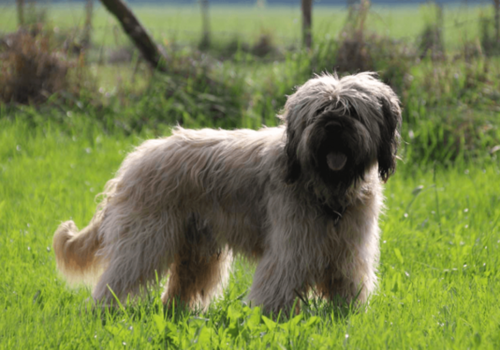- Breed Category: Herding
- Country of Origin: Portugal
- Average Height: 40-55 cm (16-22 in)
- Average Weight: 17-27 kg (37-60 lbs)
- Average Life Span: 12-14 years
- Grooming Requirements: Moderate; regular brushing needed
- Exercise Requirements: High; needs daily exercise
- Coat Type: Long and wavy
- Coat Color Variations: Black, grey, fawn, yellow
- Shedding Level: Low
- Ear Type: Drop ears
- Tail Type: Long and bushy
- Temperament: Loyal, intelligent, energetic
- Intelligence Level: High
- Barking Tendency: Moderate
- Compatibility with Children: Good with proper socialisation
- Compatibility with Other Pets: Generally good
- Training Ease: Relatively easy with consistency
- Common Health Issues: Hip dysplasia, eye conditions
- Dietary Needs: Balanced diet; high-quality dog food
- Energy Level: High
- Drooling Tendency: Low
- Sensitivity to Weather: Tolerates various climates
- Overall Maintenance Level: Moderate
- Original Purpose: Herding livestock
- Year of Recognition by Kennel Clubs: 1996
- Apartment Friendly: Not ideal; needs space
- Best Suited For: Active families, rural settings
- Cost of Ownership: Moderate
- Unique Traits: Agile, excellent herding instincts
- Cultural Significance: Valued in Portuguese rural life
- Popularity Rank: Rare outside Portugal
Imagine a dog with a lively spirit, a keen intelligence, and a coat that dances in the wind. That’s the Portuguese Sheepdog for you. Known for their agility and loyalty, these dogs are more than just herders; they’re companions with a rich history. This article aims to delve into the unique characteristics, fascinating history, and essential care tips for this remarkable breed.
The Portuguese Sheepdog, or Cão da Serra de Aires, hails from the Serra de Aires region in Portugal. Originally bred to herd sheep and cattle, these dogs have been a staple in Portuguese agriculture for centuries. Their origins trace back to the early 20th century, when they were developed to withstand the rugged terrain and demanding tasks of rural life.
Early Development and Historical Significance

Early Development of the Breed
The Portuguese Sheepdog’s journey began in the early 1900s, crafted to meet the needs of shepherds in the Serra de Aires region. These dogs were bred for their resilience and ability to navigate the challenging landscapes of Portugal. Their development was a thoughtful process, focusing on traits like intelligence, agility, and a strong work ethic.
Role in Portuguese Sheep Farming
In the world of Portuguese sheep farming, these dogs are indispensable. Their primary role has always been to herd and protect livestock, a task they perform with remarkable skill. Their keen instincts and quick reflexes make them perfect for managing flocks, ensuring the safety and efficiency of farm operations.
Key Historical Figures
While many contributed to the breed’s development, one notable figure is Dr. Manuel Marques, a veterinarian who played a crucial role in preserving the breed’s purity. His dedication ensured that the Portuguese Sheepdog remained true to its original purpose and characteristics.
Physical Characteristics
These dogs are medium-sized, with a distinctive long, wavy coat that provides protection against harsh weather. Their expressive eyes and lively demeanour reflect their intelligence and eagerness to work. With a robust build and a tail that often curls over their back, they are as striking as they are functional.
Appearance and Unique Traits
The Portuguese Sheepdog is a medium-sized breed, typically weighing between 17 to 27 kilograms. Its coat is a standout feature, long and wavy, offering protection from the elements. The colours range from shades of yellow, brown, and grey to black, often with distinctive markings that add to their charm. Their eyes are expressive, full of intelligence and curiosity, while their ears are set high, adding to their alert appearance.
Physically, these dogs are built for agility and endurance. Their robust frame and muscular build allow them to navigate rugged terrains with ease. A unique trait is their tail, which often curls over their back, giving them a distinctive silhouette.
Temperament and Behaviour
Portuguese Sheepdogs are known for their lively and intelligent nature. They are quick learners, making them excellent working dogs and companions. Their temperament is generally friendly and loyal, though they can be reserved with strangers. These dogs thrive on activity and mental stimulation, so they need plenty of exercise and tasks to keep them engaged. Their herding instincts are strong, and they excel in roles that require quick thinking and agility.
Personality Traits and Suitability

Typical Personality Traits
The Portuguese Sheepdog is a bundle of energy and intelligence. They’re fiercely loyal, always eager to please their owners. This loyalty, combined with their sharp minds, makes them not just great companions but also reliable working dogs. Their energy levels are high, so they thrive in environments where they can be active and engaged.
Suitability as a Family Pet and Working Dog
These dogs are versatile, fitting well into both family and working environments. As family pets, they are affectionate and protective, forming strong bonds with their human pack. In a working setting, their herding instincts and quick learning abilities make them invaluable. They adapt well to various roles, whether it’s herding livestock or being a loving family member.
Interaction with Children and Other Animals
Portuguese Sheepdogs are generally good with children, displaying patience and playfulness. Their protective nature ensures they keep a watchful eye on the little ones. With other animals, they can be sociable, though early socialisation is key to fostering harmonious relationships.
Training and Exercise Needs
Training a Portuguese Sheepdog is usually a rewarding experience due to their intelligence and eagerness to learn. They respond well to positive reinforcement techniques. Regular exercise is crucial, as these dogs have high energy levels. Activities like agility training, herding exercises, or long walks keep them physically and mentally stimulated.
Training, Exercise, and Health

Importance of Early Training and Socialisation
Getting a head start on training and socialisation is crucial for the Portuguese Sheepdog. These dogs are naturally intelligent and eager to learn, so introducing them to various environments, people, and other animals early on helps them grow into well-rounded adults. This early exposure curbs any potential shyness or overprotectiveness, making them more adaptable and confident.
Recommended Training Techniques
When it comes to training, positive reinforcement is the way to go. These dogs respond exceptionally well to praise, treats, and play. Consistency is key, so regular training sessions that are short and engaging work best. Incorporating games and challenges keeps their sharp minds busy and prevents boredom.
Daily Exercise Requirements and Activities They Enjoy
Portuguese Sheepdogs are high-energy and need plenty of daily exercise. Think long walks, runs, or even agility courses. They love activities that challenge both their bodies and minds. Herding exercises or interactive games are perfect for keeping them entertained and fit.
Health and Lifespan
Generally healthy, these dogs have a lifespan of around 12 to 14 years. Regular vet check-ups, a balanced diet, and plenty of exercise contribute to their longevity. Keeping an eye on their coat and ears is important, as their long hair can sometimes hide issues if not properly groomed.
Health, Grooming, and Maintenance
Common Health Issues
Portuguese Sheepdogs are generally robust, but like any breed, they can be prone to certain health issues. Hip dysplasia and eye conditions are occasionally seen, so regular vet check-ups are essential. Keeping an eye on their weight and ensuring they have a balanced diet can help prevent joint problems.
Average Lifespan and Health Tips
With a lifespan of 12 to 14 years, these dogs can be long-term companions. To keep them healthy, regular exercise is a must. A mix of physical activity and mental stimulation keeps them in top shape. A nutritious diet tailored to their needs supports their overall well-being.
Preventative Care Recommendations
Routine vaccinations and parasite control are vital. Regular dental care, including brushing their teeth, helps prevent oral health issues. Annual vet visits ensure any potential problems are caught early, keeping your dog in peak condition.
Grooming and Maintenance
Their long, wavy coat requires regular grooming to prevent matting. Brushing a few times a week keeps their coat healthy and reduces shedding. Regular ear checks are important, as their floppy ears can trap moisture, leading to infections. Bathing should be occasional, using a gentle dog shampoo to maintain their coat’s natural oils.
Coat Care and Grooming Routines

Shedding and Seasonal Grooming Tips
The Portuguese Sheepdog’s coat is a defining feature, requiring regular attention to keep it in top condition. Their long, wavy hair can be prone to tangling, so brushing a few times a week is essential. During shedding seasons, typically in spring and autumn, more frequent grooming helps manage loose hair and keeps your home fur-free. A slicker brush or a comb designed for long-haired breeds works wonders in maintaining their coat’s health and appearance.
Diet and Nutrition
A balanced diet is crucial for the Portuguese Sheepdog’s overall health and vitality. High-quality dog food, rich in protein and essential nutrients, supports their active lifestyle. Consider incorporating omega-3 fatty acids to promote a healthy coat and skin. Portion control is important to prevent obesity, which can lead to joint issues. Always ensure fresh water is available, especially after exercise, to keep them hydrated and healthy.
Nutritional Needs and Feeding Guidelines

Nutritional Needs for Optimal Health
For the Portuguese Sheepdog, a balanced diet is key to maintaining their energy and health. High-quality dog food with a good mix of proteins, fats, and carbohydrates is essential. Look for foods rich in omega-3 fatty acids to support their coat and joint health.
Foods to Include and Avoid
Include lean meats, fish, and vegetables in their diet. Avoid foods high in fillers, artificial additives, and excessive grains, as these can lead to allergies or digestive issues. Fresh fruits like apples and blueberries can be a healthy treat.
Feeding Schedules and Portion Recommendations
Feed your Portuguese Sheepdog twice a day to maintain their energy levels. Portion sizes depend on their age, weight, and activity level, but generally, 1.5 to 2.5 cups of dry food per day is a good starting point. Adjust as needed to keep them at a healthy weight.
Fun Facts and Trivia
Did you know the Portuguese Sheepdog is sometimes called the “monkey dog” due to their playful and mischievous nature? Their unique coat not only protects them from harsh weather but also gives them a distinctive, charming appearance.
Interesting Tidbits and Famous Portuguese Sheepdogs

Interesting Tidbits about the Breed
The Portuguese Sheepdog, affectionately known as the “monkey dog,” is renowned for its playful and sometimes cheeky nature. This nickname comes from their lively antics and expressive faces, which often seem to convey a sense of mischief. Their coat, a standout feature, not only provides protection from the elements but also adds to their unique charm. Interestingly, these dogs have a natural ability to adapt to various climates, making them versatile companions in different environments.
Famous Portuguese Sheepdogs in Media or History
While the Portuguese Sheepdog may not be as widely recognised in media as some other breeds, they have made their mark in history. One notable figure is Dr. Manuel Marques, who was instrumental in preserving the breed’s purity. His efforts ensured that the Portuguese Sheepdog remained true to its original characteristics, allowing it to thrive both as a working dog and a beloved pet. In recent years, the breed has gained popularity in dog shows, showcasing their agility and intelligence to a broader audience.
Final Thoughts
The Portuguese Sheepdog is a remarkable blend of agility and loyalty. This breed’s rich history and unique traits make it a cherished companion and an invaluable working dog. With their high energy and intelligence, they thrive in active environments, offering both challenges and rewards to their owners. Embracing their playful nature and herding instincts can lead to a fulfilling relationship for those willing to invest time and care. Consider welcoming a Portuguese Sheepdog into your life and experience the joy of this extraordinary breed.
